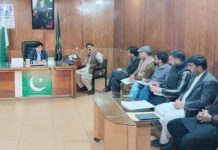ISLAMABAD, DEC 13 (DNA) – – Speakers at a multidisciplinary daylong conference urged the government and international development partners to allocate sufficient funds for mountain areas of Pakistan to ensure adaptation of climate change. Being far flung from the urban centres, the mountain communities are subject to neglect that has increased their vulnerability to the impact of climate change. They envisaged the backbone role of local educated and dynamic youth in advocacy and awareness-raising on combatting the challenges confronting the mountain communities.
Devcom-Pakistan (Development Communications Network) organised the conference on “Youth Matters for Mountains” to mark the International Mountains Day (IMD) in connection with the 9th edition of Pakistan Mountain Festival at the Comsats University Islamabad campus in collaboration with Food and Agricultural Organisation of the United Nations (FAO), WaterAid, Centre for Climate Research and Development (CCRD) and Pakistan Poverty Alleviation Fund (PPAF).
The inaugural session, Climate Change and Disaster Risk Reduction, was chaired by the chairman of Federal Floods Commission (FFC) Ahmad Kamal. The other speakers of the session were Idrees Mahsud, Director General National Disaster Management Authority (NDMA), Dr. Anjum Rasheed, Assistant Professor, Centre for Climate Research & Development (CCRD), Naeem Ashraf Raja, Director (Biodiversity), Ministry of Climate Change, Dr Imran Saquib Khallid, Research Fellow, Sustainable Development Policy Institute (SDPI).
FFC chairman Ahmad Kamal said the National Flood Protection Plan-IV is being implemented with the active participation of sun-national authorities on innovative and integrated approach incorporating structural and non-structural measures for reducing floods, reducing susceptibility to flood damages and mitigating the flood impacts keeping in view constraints, gaps and lapses in the previous Flood Protection Plans, technical shortcomings and lessons learnt from past major flood events.
Nadeem Ahmed, WaterAid Head of Policy and Advocacy, Mahboob Elahi, Former Director General Ministry of Environment, Dr. Ejaz Ahmed Khan, Associate Professor, Health Services Academy, and Dr. Sofia Khalid, Assistant Professor, Department of Environmental Sciences, Fatima Jinnah Women University (FJWU), were the main speakers of the second session on the ‘Right to Water and Sanitation’.
Nadeem Ahmad said: Extreme efforts and huge funds required to ensure every citizen right to have water, sanitation and hygiene in Pakistan. This right is extremely neglected to make Pakistan 7th on the global vulnerability index in the access to WASH needs as almost 42 per cent of the population remains without access to basic sanitation, and use polluted water.
He said the WaterAid analysis reveals that 79 million people lack a decent toilet, while 37pc have no system for wastewater disposal, which leads to spread of diseases due to contamination of water and contact with human waste.
Under the Clean Green Pakistan Programme (CGPP), WaterAid is supporting government initiatives for educational institutions and poor communities in different parts of the country.
Faizul Bari said: Food security deals with the state of having reliable access to sufficient quantity of affordable, nutritious food. Essentially a pressing social concern, the lack of food security has strong economic implications.
First, ensuring food security within the country may entail large fiscal costs as governments incentivize farm sector to ensure food self-sufficiency, and also resort to social safety net programs (including direct transfers) to keep purchasing powers of poor population intact.
In case the food self-sufficiency is not achieved, the country has to bear balance of payments cost to ensure food availability. And second, the state of food security has strong linkages with the state of human capital in the country.
High rate of malnutrition can cost an economy around 3-4 per cent of GDP. In case of Pakistan, estimates suggest that malnutrition and its outcomes cost the economy 3 per cent of GDP (US$ 7.6 billion) every year.
Shakeel Ramay said: The main issues are food availability, its accessibility and affordability for everyone.
In case of marginalised communities and low-ranks, food security is a far reach phenomena as about 40 per cent of the people live under or around the poverty-line.
High inflation, the increasing cost of production, diminishing natural resources and unfavourable weathers and climatic conditions due to climate change, reducing agricultural land because of increasing population are playing worst to food security.
The fourth panel focused on mountaineering, tourism and cultural heritage of mountains.
The panellists were well-known mountaineer Nazir Sabir, Sustainable Tourism expert Aftab ur Rehman Rana, musician and singer from Gilgit-Batistan DW Baig, leading singer from Chitral Mansoor Ali Shabab, and Munir Ahmed, founder and director of Pakistan Mountain Festival and Executive Director Devcom-Pakistan.
Nazir Sabir said: The tedious and unduly lengthy process of getting NOC from the federal ministry of interior and the inefficiency of the Alpine Club of Pakistan are the main factors halting the promotion of mountaineering and trekking in Pakistan.
Despite having largest number of world’s highest peaks and the best adventure tourism trekking attractions, lakes and high altitude national parks, we could not harness the potential of our mountains just because of lack of adequate policies and vigorous action plan of international marketing.=DNA
==============
















